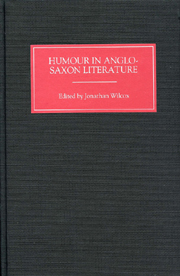Book contents
- Frontmatter
- Contents
- Contributors
- Acknowledgements
- Introduction
- Byrhtnoth's Laughter and the Poetics of Gesture
- ‘Grim Wordplay’: Folly and Wisdom in Anglo-Saxon Humor
- Humor, Wordplay, and Semantic Resonance in Beowulf
- Heroic Humor in Beowulf
- Humor in Hiding: Laughter Between the Sheets in the Exeter Book Riddles
- Sexual Humor and Fettered Desire in Exeter Book Riddle 12
- ‘Why do you speak so much foolishness?’ Gender, Humor, and Discourse in Ælfric's Lives of Saints
- A Funny Thing Happened on the Way to Heaven: Humorous Incongruity in Old English Saints' Lives
- Index
‘Why do you speak so much foolishness?’ Gender, Humor, and Discourse in Ælfric's Lives of Saints
Published online by Cambridge University Press: 12 September 2012
- Frontmatter
- Contents
- Contributors
- Acknowledgements
- Introduction
- Byrhtnoth's Laughter and the Poetics of Gesture
- ‘Grim Wordplay’: Folly and Wisdom in Anglo-Saxon Humor
- Humor, Wordplay, and Semantic Resonance in Beowulf
- Heroic Humor in Beowulf
- Humor in Hiding: Laughter Between the Sheets in the Exeter Book Riddles
- Sexual Humor and Fettered Desire in Exeter Book Riddle 12
- ‘Why do you speak so much foolishness?’ Gender, Humor, and Discourse in Ælfric's Lives of Saints
- A Funny Thing Happened on the Way to Heaven: Humorous Incongruity in Old English Saints' Lives
- Index
Summary
The humorless reputation of Anglo-Saxon England is well-known: it is generally perceived to have been a gloomy place, its literature often seen as grim, bloody, and above all somber in its treatment of Germanic warriors or Christian heroes. For students first encountering Old English literature in undergraduate survey courses, this reputation is solidified by the editorial introduction in the Norton Anthology of English Literature:
The world of Old English poetry is predominantly harsh. Men are said to be cheerful in the mead hall, but even there they think of struggle in war, of possible triumph but more possible failure. … Even in its most lyrical moments there is an austere dignity to Old English verse, which rarely strays from the themes of the glory of God and His champions and the pain and sorrow of this world.
Perhaps even less likely to provoke the interest of many non-specialist readers is the following misguided comment from the most recent edition of the Norton Anthology of Literature by Women: ‘Anglo-Saxon culture, which predated Christianity in England, was oblivious of or hostile to women.’ If these views have become the canonical ‘rules’ about Old English literature, it is time to start examining the exceptions to those rules. This essay will suggest not only that a certain number of Old English prose texts incorporate both playful and serious humor to promote Christian doctrine, but also that they do so by means of strong, wise, witty, and eloquent women characters.
- Type
- Chapter
- Information
- Humour in Anglo-Saxon Literature , pp. 127 - 136Publisher: Boydell & BrewerPrint publication year: 2000



